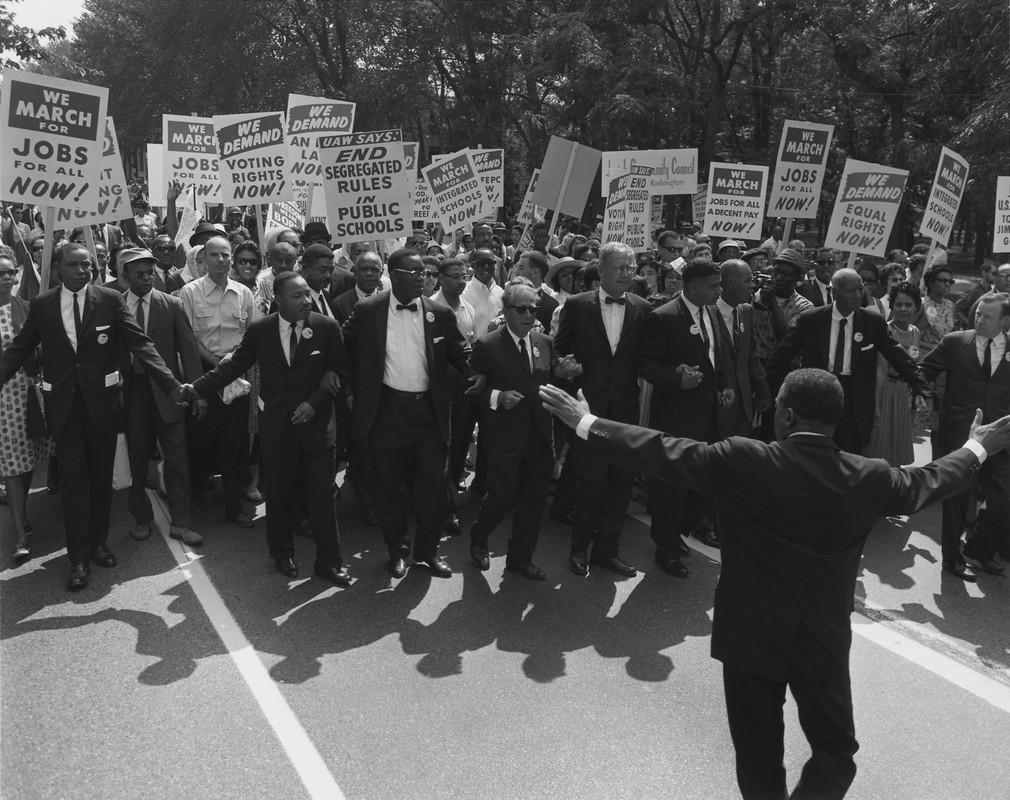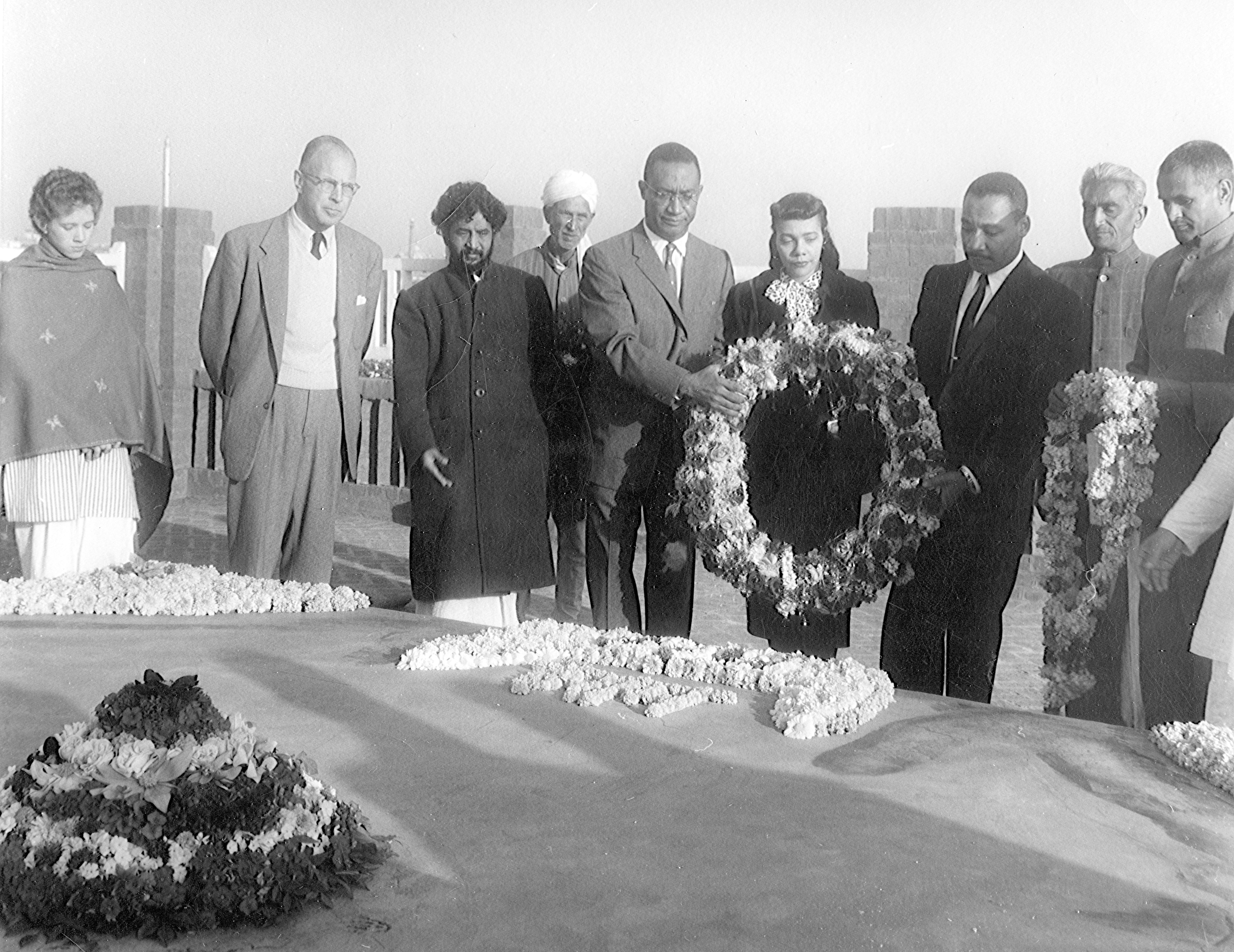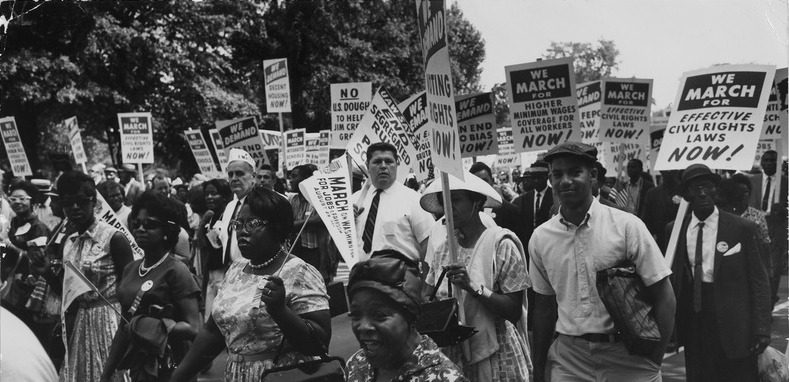
Martin Luther King, Jr. and Coretta Scott King, 1959. Creative Commons via Wikipedia
When the Rev. Dr. Martin Luther King, Jr., was awarded the Nobel Peace Prize in 1964, it was greeted with much satisfaction by those associated with the American Friends Service Committee. For one thing, AFSC had nominated him for the prize, a privilege of all former recipients. For another thing, AFSC had many connections with King in the 1950s and '60s, and its social action during that time was interwoven with the Civil Rights Movement.
King urges Quakers to join the Montgomery Bus Boycott
The beginning of this story is familiar: Rosa Parks, an African-American, refused to give up her seat to a white person on a Montgomery, Alabama, bus in the summer of 1955. Her arrest resulted in a boycott of the local transportation system by Montgomery's African-American community.
The boycott was thoroughly discussed at the United Philadelphia Yearly Meeting in March 1956—along with the astonishing Gandhian methods used by a young Montgomery clergyman, Martin Luther King, Jr., in leading the boycott. Initially, the yearly meeting was unable to come to consensus about whether it should send a letter to people in Montgomery regarding the difficult racial situation.
However, at the next session, the secretary of the Yearly Meeting Peace Committee reported he had spoken to King by telephone about the possibility of sending a delegation of Friends to visit Montgomery. King welcomed the idea. The yearly meeting appointed three Friends to go, one of whom was Clarence Pickett, then executive secretary emeritus of AFSC. This became one of the earliest occasions on which someone affiliated with AFSC came in contact with King.
The delegation spent several days in Montgomery learning about the situation and talking to various community leaders. They were impressed by King's leadership and his nonviolent approach.
AFSC arranges for King to go to India
In 1959, after King became internationally known from the Montgomery boycott, AFSC arranged an invitation for him to visit India on a pilgrimage to the people and places associated with Mahatma Gandhi. He and his wife, Coretta Scott King, traveled in India under the auspices of the Gandhi Memorial Trust. They were accompanied by Jim Bristol, an AFSC representative serving in Delhi.

Martin Luther King, Jr. in India
Writing much later about this trip, Jim Bristol said the Kings' visit and the reception they received in India confirmed their nonviolent convictions and practices (rather than forming them, as people later asserted). Furthermore, Jim Bristol believed that the Kings accepted the inevitability that Martin would be killed some day. Following Gandhi's trail must have reinforced rather than diminished this sense of being under sentence. "It was only a matter of time; that, they knew and accepted. Yet this never made them prudent or cautious."
AFSC publishes "Letter from Birmingham City Jail"
AFSC's civil rights efforts paralleled much of King's activities and intersected them at several important points. In 1963, when King was jailed in Birmingham for leading a nonviolent demonstration against segregation, he was criticized in a statement by eight white religious leaders. In response, he wrote "Letter from Birmingham City Jail," published by AFSC, in which he spoke powerfully of the great freedoms rooted in our religious faith and national principles.

In his letter, King writes “I have almost reached the regrettable conclusion that the Negro’s great stumbling block in the stride toward freedom is not the White Citizens Councillor or the Ku Klux Klanner but the white moderate who is more devoted to order than to justice; who prefers a negative peace which is the absence of tension to a positive peace which is the presence of justice; who constantly says, ‘I agree with you in the goal you seek, but I can’t agree with your methods of direct action’; who paternalistically feels that he can set the timetable for another man’s freedom; who lives by the myth of time; and who constantly advises the Negro to wait until a ‘more convenient season.’”
This letter became so popular that AFSC printed and distributed several hundred thousand copies in advance of the March on Washington, endorsed by AFSC's Board of Directors.
AFSC endorses the Poor People's Campaign
Organized by the Southern Christian Leadership Conference (SCLC) and led by King, the Poor People's Campaign mobilized tens of thousands of people across the country to demand economic justice in 1968.

Creative Commons
Said King: "America is at a crossroads of history, and it is critically important for us as a nation and a society to choose a new path and move upon it with resolution and courage. In this age of technological wizardry and political immorality, the poor are demanding that the basic needs of people be met as the first priority of our domestic program."
AFSC was one of the principal endorsers of the Poor People's Campaign. AFSC’s Barbara Moffet worked directly with King and SCLC to develop the campaign's platform. After King was assassinated on April 4, 1968, organizers decided to continue the campaign in King’s honor, and AFSC and others mobilized people across the country to come to Washington, D.C. for two weeks of protest.
An important shift in Quaker testimony and AFSC's work
Years later, longtime staff and committee member Steve Cary said that King and the Civil Rights Movement played a big role in AFSC's evolving understanding of nonviolence. Originally seen as a testimony against war, the Quaker stand against violence expanded to include the roots of violence—injustice, poverty, and oppression.
Adapted from text written by Jack Sutters, former AFSC archivist